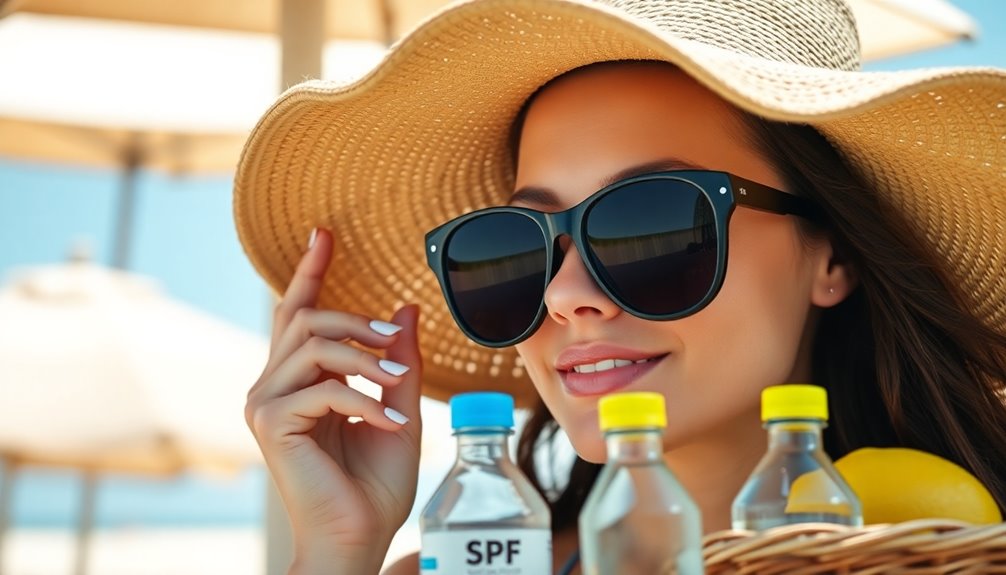To prevent sun damage effectively, apply sunscreen 15 minutes before going outdoors. Opt for water-resistant SPF 30+ sunscreen, reapplying every two hours. Cover all exposed areas. Monitor moles for any changes and see a dermatologist regularly. Manage your vitamin D levels through diet and supplements instead of sun exposure. If sunburnt, soothe with aloe vera gel and dress in protective clothing. Wear UV-blocking sunglasses, wide-brimmed hats, and shoes that cover your feet. These steps form a thorough plan to safeguard your skin.
Sunscreen Application Tips
For effective sun protection, applying sunscreen correctly is essential. To shield your skin from harmful UV rays, make sure to apply sunscreen at least 15 minutes before heading outdoors.
Opt for a water-resistant sunscreen if you plan on swimming or sweating, and remember to reapply every two hours. Ensure that every exposed area, including ears, lips, and hands, is covered with sunscreen.
Even on cloudy days, UV rays can still penetrate through, so don't skip this important step in your skincare routine. Select a broad-spectrum sunscreen with SPF 30 or higher to effectively block both UVA and UVB rays.
Choosing the Right Sunscreen
To make an informed decision when choosing sunscreen, consider key factors such as protection against UVA and UVB rays, the SPF level, water resistance, and the type of sunscreen formula.
Opt for broad-spectrum sunscreens that shield you from both types of UV rays. Choose a sunscreen with an SPF of 30 or higher for better protection against sunburn and skin damage. Water-resistant formulas are ideal, especially if you'll be swimming or sweating.
Mineral sunscreens create a physical barrier, while chemical sunscreens work by absorbing UV radiation. Remember to reapply sunscreen every two hours to guarantee continuous coverage, especially after swimming or sweating.
Skin Changes to Watch For
Keep a close eye on your skin to detect any potential changes that could signal skin abnormalities. Monitoring moles for alterations in asymmetry, border, color, diameter, and evolution is critical in spotting early signs of skin abnormalities caused by sun exposure. Regular skin exams by a dermatologist play an essential role in the early detection of any concerning skin changes.
Different types of skin cancers can manifest in various ways, so it's important to be watchful for any evolving skin changes that might indicate skin damage from UV rays. If you notice any suspicious or changing skin lesions, it's vital to promptly consult a dermatologist to prevent potential skin cancer. Monthly self-examinations are also recommended to help in detecting any skin irregularities early on and seeking timely medical attention for any concerning skin changes.
Vitamin D and Sun Exposure
Monitoring your vitamin D levels is crucial for overall health, and there are alternative ways to address deficiencies without relying on sun exposure. Vitamin D deficiency can be managed through diet and supplements, negating the need for prolonged sun exposure.
Dairy products, eggs, milk, and fish are rich sources of vitamin D that can help maintain sufficient levels in your body. Over-the-counter supplements are also available to enhance vitamin D levels, eliminating the necessity for sun exposure altogether.
Sun exposure isn't a mandatory requirement for meeting vitamin D needs, thereby allowing you to safeguard your skin from potential damage caused by UV rays. It's advisable to consult with your healthcare provider before starting any supplements to ensure proper management of your vitamin D levels without having to depend on sun exposure.
Make informed choices to protect your skin while maintaining peak vitamin D levels.
Sunburn Relief Techniques
After spending time in the sun, sunburn relief techniques can help alleviate discomfort and promote healing. To soothe sunburned skin, consider taking a cool shower or applying cool compresses. Aloe vera gel is also known for its calming effects on sunburn. Moisturizing sunburned areas with gentle lotions can aid in healing and prevent peeling. If you're experiencing inflammation and pain, pain relievers such as acetaminophen or ibuprofen may provide relief.
Remember to avoid further sun exposure to prevent worsening of sunburn and additional skin damage. Seek shade whenever possible and wear protective clothing when outdoors. Taking these steps can help your skin recover from sunburn more quickly and prevent long-term damage.
If your sunburn is severe or if you have blisters, consult a healthcare professional for further guidance. By following these sunburn relief techniques and avoiding sun exposure, you can promote healing and reduce discomfort.
Clothing for Sun Protection
For best protection against harmful UV rays, selecting appropriate clothing is essential. Opt for lightweight, long-sleeved shirts and pants to maximize coverage. When choosing fabrics, go for tight weaves and dark or vivid colors for better sun protection.
Look out for clothing with UPF (Ultraviolet Protection Factor) numbers on the label to enhance defense against UV rays. Avoid loose or open-weave fabrics like lace that offer minimal sun protection. Remember, dry clothing provides more sun protection than wet clothing, so keep this in mind when planning your outfit for sun exposure.
Accessories for UV Defense
To shield yourself from harmful UV rays and complete your sun protection arsenal, consider incorporating accessories that offer additional defense. Sunglasses with UV protection are essential for safeguarding your eyes from the sun's damaging rays. Look for sunglasses with large frames or wraparound styles to ensure maximum coverage and protection.
It's vital to select sunglasses that specifically mention UV protection to prevent eye damage and potential vision problems. Avoid sunglasses that only darken your vision without providing UV protection, as they won't shield your eyes effectively.
When engaging in outdoor activities, always prioritize sunglasses with UV protection to keep your eyes safe and healthy. Remember, your eyes are just as vulnerable to sun damage as your skin, so investing in quality sunglasses with UV protection is a necessity for thorough sun protection.
Headwear for Sun Safety
Sunglasses are a key component of your UV defense, but don't overlook the importance of headwear for thorough sun safety.
When choosing headwear for sun protection, opt for a wide-brimmed hat with at least a 2- to 3-inch brim to shield your face and neck from harmful UV rays. Look for hats with a dark underside on the brim to reduce glare and reflection, enhancing your sun protection.
Consider shade caps or hats with draped fabric for added neck coverage to prevent sunburn in sensitive areas. While stylish, straw hats are generally less protective against UV rays compared to hats made from tightly woven fabric.
Avoid solely relying on baseball caps as they may not provide adequate coverage for your ears and neck, leaving these areas vulnerable to sun damage. Prioritize headwear that offers thorough protection to keep you safe from the sun's harmful UV rays.
Footwear Protection Measures
When considering protection from the sun, don't overlook the significance of safeguarding your feet with appropriate footwear. Wearing shoes that cover your feet is vital to protect them from sunburn and UV damage. If you opt for sandals, make sure to apply sunscreen to the exposed skin on your feet to prevent sun damage. Avoid going barefoot in the sun to decrease the risk of sunburn and skin damage.
Remember that all exposed skin needs protection, including your feet, to prevent UV radiation harm. Sunscreen with an SPF is essential if you're not wearing covered shoes to shield your feet from sun damage. Be aware that UV rays can penetrate through light materials, so make sure your footwear provides adequate protection.
Conclusion
To keep your skin safe from sun damage, make sure to apply sunscreen regularly, wear protective clothing, and stay aware of any changes to your skin. Remember to choose a sunscreen with broad spectrum protection and reapply every two hours, especially when swimming or sweating. Stay proactive about sun protection to prevent sunburns, premature aging, and skin cancer. Enjoy the sun safely by taking these simple precautions.


